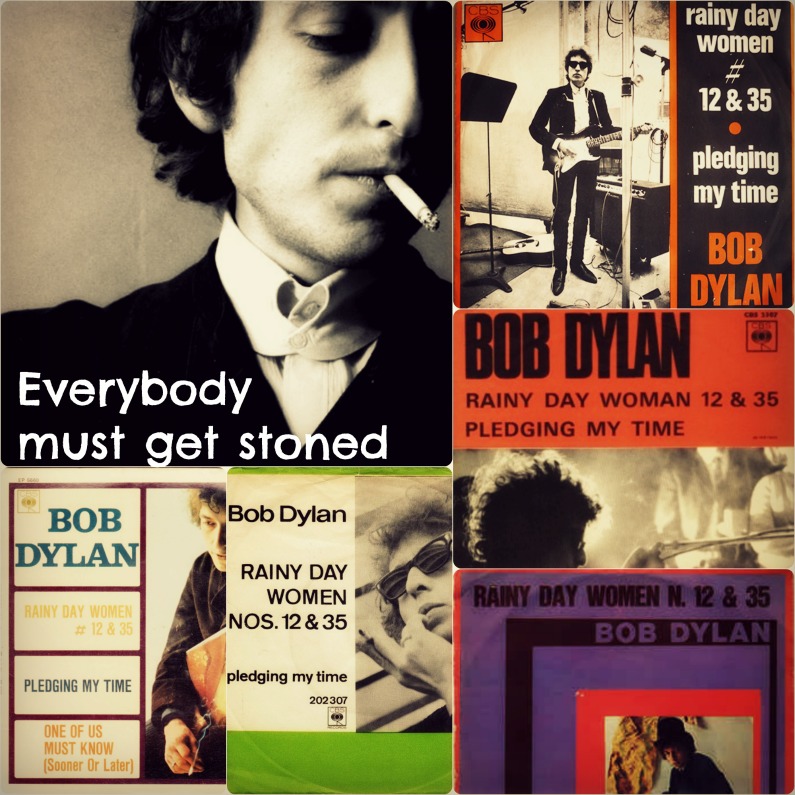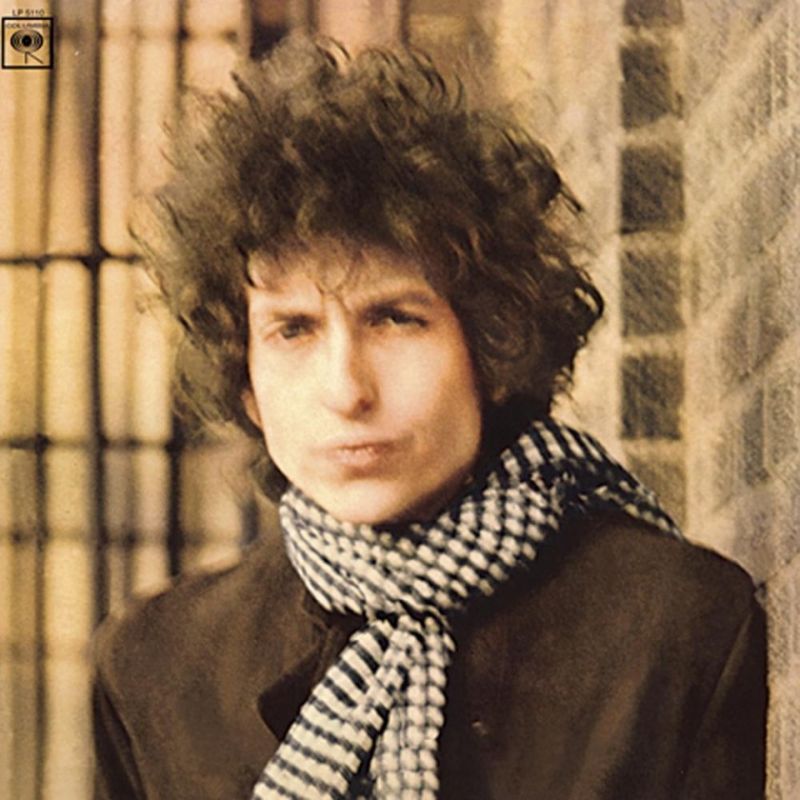
Well, they’ll stone ya when you’re trying to be so good
They’ll stone ya just a-like they said they would
They’ll stone ya when you’re tryin’ to go home
Then they’ll stone ya when you’re there all alone
But I would not feel so all alone
Everybody must get stoned
[vc_row][vc_column][vc_message message_box_color=”mulled_wine” icon_fontawesome=”fa fa-quote-left”]Rainy Day Women happens to deal with a minority of, you know, cripples and orientals and, uh, you know, and the world in which they live, you realize, you know, you understand, you know. It’s another sort of a North Mexican kind of a thing, uh, very protesty. Very, very protesty. And, uh, one of the protestiest of all things I ever protested against in my protest years. But, uh…
~Bob Dylan (to Klas Burling – April 1966)[/vc_message][/vc_column][/vc_row]
[vc_row][vc_column][vc_message message_box_color=”mulled_wine” icon_fontawesome=”fa fa-quote-left”]The memorable joke in the chorus is about marijuana (although it could just as easily be about alcohol), but the song as a whole is about persecution, specifically criticism, and the message in the chorus is a straightforward one: it happens to everybody, so don’t feel bad (and, implicitly, don’t be such a victim about it).
The combination drunk party/revival meeting sound of the song is wonderful, a product of the unique musical chemistry Dylan and the Nashville studio musicians (under the leadership of Charlie McCoy and producer Bob Johnston, with help from Kooper and Robertson) achieved during these freewheeling ses- sions. This is not country music. This is not Dylan music as defined by any earlier Dylan album. It’s only rock and roll in the broadest, most all-encompassing sense..
-Paul Williams[/vc_message][/vc_column][/vc_row]
TOC
[vc_row][vc_column][vc_message message_box_style=”outline” icon_fontawesome=”fa fa-link” css_animation=”bounceIn”]
Check out:
- Bob Dylan’s Best Songs: Queen Jane Approximately
- Bob Dylan’s Best Songs: Just Like A Woman
- Bob Dylan’s Best Songs: Scarlet Town
- Bob Dylan’s Best Songs: Nettie Moore
- Bob Dylan’s Best Songs: Tryin’ To Get To Heaven
- Bob Dylan’s Best Songs: I’ll Keep It With Mine
[/vc_message][/vc_column][/vc_row]
Facts

Wikipedia:
“Rainy Day Women ♯12 & 35” is a song by Bob Dylan. It is the opening track of his 1966 album, Blonde on Blonde. It was initially released as a single in April 1966, reaching No. 7 in the UK and No. 2 in the US chart. “Rainy Day Women”, recorded in the Nashville studio of Columbia Records, features a raucous brass band backing track. The song’s title does not appear anywhere in the lyrics and there has been much debate over the meaning of the recurrent chorus, “Everybody must get stoned”. This has made the song controversial, being labelled by some commentators as “a drug song”.
[vc_row][vc_column][vc_message message_box_style=”outline” icon_fontawesome=”fa fa-link” css_animation=”bounceIn”]
Check out:
[/vc_message][/vc_column][/vc_row]
Known studio recordings:
Columbia Music Row Studios
Nashville, Tennessee
March 10, 1966
Two takes.
Musicians:
- Bob Dylan (guitar, harmonica, vocal)
- Charlie McCoy (bass, trumpet)
- Wayne Butler (trombone)
- Joe South (guitar, bass)
- Al Kooper (organ)
- Henry Strzelecki (bass)
- Kenneth Buttrey (drums)
Technical Team:
- Producers: Bob Johnston
Live:
- First known live performance: Isle of Wight, August 31, 1969
- It has been performed 963 times live – last performance: Empire Polo Club, Indio, California – October 14, 2016
- Top year: 1998 – 102 performances
Quotes
According to Al Kooper in Backstage Passes, it was not actually Dylan’s idea to turn the song into a revivalist sing-along: ‘Dylan was teachin’ us [the] song one night when [producer Bob] Johnston suggested it would sound great Salvation Army style. Dylan thought it over and said it might work. But where would we get hornplayers at this hour? “Not to worry,” says Charlie McCoy and grabs the phone. It’s 4.30 a.m. when he makes the call. . . . At 5 a.m. in walks a trombone player. . . . He sat down and learned the song, they cut three takes, and at 5.30 he was out of the door and gone.’ Actually the song appears to have been cut around one in the morning, but that’s close enough for Al.
-Heylin, Clinton. Revolution in the Air: The Songs of Bob Dylan 1957-1973 (Songs of Bob Dylan Vol 1) (pp. 309-310). Little, Brown Book Group. Kindle Edition.
Bob being Bob once described it as “a Portuguesefolk song”. The symbolic stoning is certainly biblicalin nature, and Dylan was getting hit with plenty, be they cast from the press or fans screaming “Judas!” Scholars have come up with various interpretations: one claims it’s about Dylan’s mother, whose maidenname was Stone. But Bob reportedly heard Ray Charles’s Let’s Go Get Stoned right before writing it. Time Magazine (mistakenly) claimed a “rainy day woman” was a “marijuana cigarette”.The 4am recording sounds like one helluva party. So the simplest interpretation remains the world’s gonna getcha… so you might as well get stoned.
-Bill Holdship (MOJO – Dylan’s 100 Greatest Songs)
“I never have and never will write a drug song,” Bob Dylan famously announced during his legendary performance at London’s Royal Albert Hall in May 1966, but that hasn’t stopped several generations of dope smokers from adopting the lead track from Blonde on Blonde (which also hit Number Two on the Billboard singles chart in the spring of ’66) as an anthem. The song’s woozy chorus of “Everybody must get stoned!” is obviously responsible, along with the claim that “rainy day woman” is old-school weed-head slang for a joint – though some new-school stoners will also
helpfully point out that 12 times 35 equals 420, maaan.
The Mighty Zimm, however, continues to insist that the stoning in question was Biblical, not herbal. “It doesn’t surprise me that some people would see it that way,” he told Rolling Stone in 2012. “But these are people that aren’t familiar with the Book of Acts.”
–rollingstone.com (Pot Sounds: The 20 Greatest Weed-Themed Songs of All Time)
Lyrics
Well, they’ll stone ya when you’re trying to be so good
They’ll stone ya just a-like they said they would
They’ll stone ya when you’re tryin’ to go home
Then they’ll stone ya when you’re there all alone
But I would not feel so all alone
Everybody must get stoned
Well, they’ll stone ya when you’re walkin’ ’long the street
They’ll stone ya when you’re tryin’ to keep your seat
They’ll stone ya when you’re walkin’ on the floor
They’ll stone ya when you’re walkin’ to the door
But I would not feel so all alone
Everybody must get stoned
They’ll stone ya when you’re at the breakfast table
They’ll stone ya when you are young and able
They’ll stone ya when you’re tryin’ to make a buck
They’ll stone ya and then they’ll say, “good luck”
Tell ya what, I would not feel so all alone
Everybody must get stoned
Well, they’ll stone you and say that it’s the end
Then they’ll stone you and then they’ll come back again
They’ll stone you when you’re riding in your car
They’ll stone you when you’re playing your guitar
Yes, but I would not feel so all alone
Everybody must get stoned
Well, they’ll stone you when you walk all alone
They’ll stone you when you are walking home
They’ll stone you and then say you are brave
They’ll stone you when you are set down in your grave
But I would not feel so all alone
Everybody must get stoned
Live versions
Treptower Festwiese
East Berlin, East Germany
17 September 1987
- Bob Dylan (vocal & guitar) with Tom Petty & The Heartbreakers.
- Tom Petty (guitar)
- Mike Campbell (guitar)
- Benmont Tench (keyboards)
- Howie Epstein (bass)
- Stan Lynch (drums)
- and with The Queens Of Rhythm: Carolyn Dennis, Queen Esther Marrow, Madelyn Quebec (backing vocals)
–
Hammersmith, London
February 6, 1990
- Bob Dylan (Vocal & guitar)
- G. E. Smith (guitar)
- Tony Garnier (bass)
- Christopher Parker (drums)
Roseland Ballroom
New York City, New York
20 October 1994
- Bob Dylan (vocal & guitar)
- Bruce Springsteen (guitar)
- Neil Young (guitar)
- Bucky Baxter (pedal steel guitar & electric slide guitar)
- John Jackson (guitar)
- Tony Garnier (bass)
- Winston Watson (drums & percussion)
House Of Blues
Atlanta, Georgia
3 August 1996
- Bob Dylan (vocal & guitar)
- Bucky Baxter (pedal steel guitar & electric slide guitar)
- John Jackson (guitar)
- Tony Garnier (bass)
- Winston Watson (drums & percussion)
–
Newcastle Arena
Newcastle, England
20 June 1998
- Bob Dylan (vocal & guitar)
- Bucky Baxter (pedal steel guitar & electric slide guitar)
- Larry Campbell (guitar)
- Tony Garnier (bass)
- David Kemper (drums & percussion)
–
Velódromo Luis Puig
Valencia, Spain
15 April 1999
- Bob Dylan (vocal & guitar)
- Bucky Baxter (pedal steel guitar & electric slide guitar)
- Larry Campbell (guitar)
- Tony Garnier (bass)
- David Kemper (drums & percussion)
—
Cover Versions
–
Flatt and Scruggs
–
The Black Crowes
–
Tom Petty & The Heartbreakers
–
The Beatles
–
[vc_row][vc_column][vc_message message_box_style=”outline” icon_fontawesome=”fa fa-link” css_animation=”bounceIn”]
Check out:
[/vc_message][/vc_column][/vc_row]
–
Sources
- Bob Dylan – The Lyrics: Since 1962
- Philippe Margotin & Jean-Michel Guesdon – Bob Dylan All the Songs: The Story Behind Every Track
- Clinton Heylin – Revolution in the Air: The Songs of Bob Dylan, 1957-1973
- Paul Williams – Bob Dylan Performing Artist I: The Early Years 1960-1973
- MOJO Magazine – Mojo – The 100 greatest Dylan songs (september 2005)
- Wikipedia
- Olof’s – Still On The Road
- bobdylan.com
-Egil
